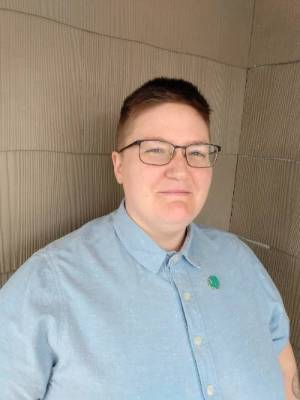Dr. Whitney Gecker
Assistant Professor, Sociology, Anthropology, Social Work

- whitney.gecker@mcla.edu
- Phone
- (413) 662-5367
- Office
- Murdock Hall 324
Education
MA, University of Massachusetts, Boston, 2013
BA, George Mason University, 2009
Courses Taught
SOWK 395: Working with Youth
SOCI 331: Research Methods
Assistant professor of social work
About me
From direct service with teenagers, to a research agenda focused on the development of youth, my research and practical experiences drive my enthusiasm for working with college students. I strongly believe that classrooms are a sacred space, in which individuals can come together, discuss sticky or “controversial” topics, and learn from one another. My path into higher education was not so straight-forward and it wasn’t until my second year of college that I felt like I belonged on campus. Because of this, I welcome all into my classrooms. I am committed to practicing my values of anti-racism and intersectional feminism. You do not have to agree with me to enter my classroom: I only ask that you come with a willingness to be open and honest (with yourself first). Before pursuing my graduate studies, I worked as a case manager in a homeless shelter, volunteered with a sex worker advocacy group, and facilitated international reconciliation youth trips. Through all of these experiences I learned and relearned the importance of “meeting people where they’re at,” and I take this philosophy into my practice as an educator. I know my classes can’t be everything to every student at all times (the horror!). Therefore, I believe for myself and my students that if we can make meaningful connections, hold space (for ourselves and others) to change, and make a commitment to unearthing inequality, that will be enough.
Research and creative interests
Trained as a sociologist and a social worker, I’m interested in both people and structures. My research up to this point primarily investigates youth civic engagement, as well as how young people understand privilege and diversity. Place, and the importance of place, is central to my research interests; this is because where a person grows up, or lives, matters very much to how they grow, what they learn, and the ideas and values they hold. My current work examines the predominately white, affluent suburb of Newton, MA in order to better understand how privilege is normalized and inherited.
Publications
Schutt, R., Gecker, W., & Zaykowski, H. 2020. Engaging youth to reduce depression and risky behaviors: Challenges of empowerment. Urban Social Work, 4(1): 5-27.
Augsberger, A., Gecker, W., & Collins, M. 2019. “We make a direct impact on people’s lives:” Youth empowerment in the context of a youth-led participatory budgeting project. Journal of Community Psychology, 47(3): 462-476.
Collins, M., Augsberger, A., & Gecker, W. 2016. Youth councils in municipal government: Examination of activities, impact and barriers. Children and Youth Services Review, 65: 140-147.
talks and presentations
2019. Privilege and Diversity in the Suburbs: Affluent Youth and Responses to Inequality. Paper presented at ESS: Eastern Sociological Society APM. Boston, MA.
2019. From Ferguson to Parkland: What anti-gun violence activism teaches us about youth civic engagement. Paper presented at SSWR: Society for Social Work Research APM. San Francisco, CA. With A. Augsberger & M. Collins.
2017. Gentrification as Political Persona: Strong-Mayor Form and the Influence of Local Government. Paper presented at ASA: American Sociological Association APM. Montreal, Canada.
